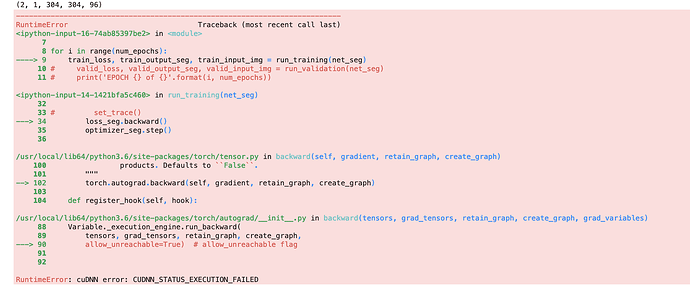@ptrblck I finally got to test a bit more. Using different batch sizes worked for a while but now I changed input data and it pretty much fails with all batch sizes that I have tried.
CUDA_LAUNCH_BLOCKING=1 didn’t do anything, allocated some memory on the GPU but then somehow got stuck and didn’t react on any keyboard interrupts.
Defaults for this optimization level are:
enabled : True
opt_level : O1
cast_model_type : None
patch_torch_functions : True
keep_batchnorm_fp32 : None
master_weights : None
loss_scale : dynamic
Processing user overrides (additional kwargs that are not None)...
After processing overrides, optimization options are:
enabled : True
opt_level : O1
cast_model_type : None
patch_torch_functions : True
keep_batchnorm_fp32 : None
master_weights : None
loss_scale : dynamic
Gradient overflow. Skipping step, reducing loss scale to 32768.0
Train Epoch: 1 [0/111 (0%)] Loss: 197.427246
Gradient overflow. Skipping step, reducing loss scale to 16384.0
Train Epoch: 1 [36/111 (30%)] Loss: 208.496323
Train Epoch: 1 [72/111 (60%)] Loss: 261.294617
Traceback (most recent call last):
File "/usr/local/lib64/python3.6/site-packages/torch/tensor.py", line 102, in backward
torch.autograd.backward(self, gradient, retain_graph, create_graph)
File "/usr/local/lib64/python3.6/site-packages/torch/autograd/__init__.py", line 90, in backward
allow_unreachable=True) # allow_unreachable flag
RuntimeError: cuDNN error: CUDNN_STATUS_EXECUTION_FAILED
I! CuDNN (v7402) function cudnnGetConvolutionBackwardFilterAlgorithmMaxCount() called:
i! handle: type=cudnnHandle_t; streamId=(nil) (defaultStream);
i! Time: 2019-05-16T16:12:59.272653 (0d+0h+1m+10s since start)
i! Process=12596; Thread=12826; GPU=0; Handle=0x7fa31800ad00; StreamId=(nil) (defaultStream).
I! CuDNN (v7402) function cudnnGetConvolutionBackwardFilterAlgorithmMaxCount() called:
i! handle: type=cudnnHandle_t; streamId=(nil) (defaultStream);
i! Time: 2019-05-16T16:12:59.272662 (0d+0h+1m+10s since start)
i! Process=12596; Thread=12826; GPU=0; Handle=0x7fa31800ad00; StreamId=(nil) (defaultStream).
I! CuDNN (v7402) function cudnnGetConvolutionBackwardFilterWorkspaceSize() called:
i! handle: type=cudnnHandle_t; streamId=(nil) (defaultStream);
i! xDesc: type=cudnnTensorDescriptor_t:
i! dataType: type=cudnnDataType_t; val=CUDNN_DATA_HALF (2);
i! nbDims: type=int; val=5;
i! dimA: type=int; val=[2,16,128,128,64];
i! strideA: type=int; val=[16777216,1048576,8192,64,1];
i! dyDesc: type=cudnnTensorDescriptor_t:
i! dataType: type=cudnnDataType_t; val=CUDNN_DATA_HALF (2);
i! nbDims: type=int; val=5;
i! dimA: type=int; val=[2,16,128,128,64];
i! strideA: type=int; val=[16777216,1048576,8192,64,1];
i! convDesc: type=cudnnConvolutionDescriptor_t:
i! mode: type=cudnnConvolutionMode_t; val=CUDNN_CROSS_CORRELATION (1);
i! dataType: type=cudnnDataType_t; val=CUDNN_DATA_FLOAT (0);
i! mathType: type=cudnnMathType_t; val=CUDNN_TENSOR_OP_MATH (1);
i! arrayLength: type=int; val=3;
i! padA: type=int; val=[1,1,1];
i! strideA: type=int; val=[1,1,1];
i! dilationA: type=int; val=[1,1,1];
i! groupCount: type=int; val=1;
i! dwDesc: type=cudnnFilterDescriptor_t:
i! dataType: type=cudnnDataType_t; val=CUDNN_DATA_HALF (2);
i! vect: type=int; val=0;
i! nbDims: type=int; val=5;
i! dimA: type=int; val=[16,16,3,3,3];
i! format: type=cudnnTensorFormat_t; val=CUDNN_TENSOR_NCHW (0);
i! algo: type=cudnnConvolutionBwdFilterAlgo_t; val=CUDNN_CONVOLUTION_BWD_FILTER_ALGO_1 (1);
i! Time: 2019-05-16T16:12:59.272682 (0d+0h+1m+10s since start)
i! Process=12596; Thread=12826; GPU=0; Handle=0x7fa31800ad00; StreamId=(nil) (defaultStream).
I! CuDNN (v7402) function cudnnConvolutionBackwardFilter() called:
i! handle: type=cudnnHandle_t; streamId=(nil) (defaultStream);
i! alpha: type=CUDNN_DATA_FLOAT; val=1.000000;
i! xDesc: type=cudnnTensorDescriptor_t:
i! dataType: type=cudnnDataType_t; val=CUDNN_DATA_HALF (2);
i! nbDims: type=int; val=5;
i! dimA: type=int; val=[2,16,128,128,64];
i! strideA: type=int; val=[16777216,1048576,8192,64,1];
i! xData: location=dev; addr=0x7f9f38000000;
i! dyDesc: type=cudnnTensorDescriptor_t:
i! dataType: type=cudnnDataType_t; val=CUDNN_DATA_HALF (2);
i! nbDims: type=int; val=5;
i! dimA: type=int; val=[2,16,128,128,64];
i! strideA: type=int; val=[16777216,1048576,8192,64,1];
i! dyData: location=dev; addr=0x7f9f40000000;
i! convDesc: type=cudnnConvolutionDescriptor_t:
i! mode: type=cudnnConvolutionMode_t; val=CUDNN_CROSS_CORRELATION (1);
i! dataType: type=cudnnDataType_t; val=CUDNN_DATA_FLOAT (0);
i! mathType: type=cudnnMathType_t; val=CUDNN_TENSOR_OP_MATH (1);
i! arrayLength: type=int; val=3;
i! padA: type=int; val=[1,1,1];
i! strideA: type=int; val=[1,1,1];
i! dilationA: type=int; val=[1,1,1];
i! groupCount: type=int; val=1;
i! algo: type=cudnnConvolutionBwdFilterAlgo_t; val=CUDNN_CONVOLUTION_BWD_FILTER_ALGO_1 (1);
i! workSpace: location=dev; addr=0x7fa026920000;
i! workSpaceSizeInBytes: type=size_t; val=2754704;
i! beta: type=CUDNN_DATA_FLOAT; val=0.000000;
i! dwDesc: type=cudnnFilterDescriptor_t:
i! dataType: type=cudnnDataType_t; val=CUDNN_DATA_HALF (2);
i! vect: type=int; val=0;
i! nbDims: type=int; val=5;
i! dimA: type=int; val=[16,16,3,3,3];
i! format: type=cudnnTensorFormat_t; val=CUDNN_TENSOR_NCHW (0);
i! dwData: location=dev; addr=0x7fa059ff3000;
i! Time: 2019-05-16T16:12:59.272707 (0d+0h+1m+10s since start)
i! Process=12596; Thread=12826; GPU=0; Handle=0x7fa31800ad00; StreamId=(nil) (defaultStream).
I! CuDNN (v7402) function cudnnDestroyConvolutionDescriptor() called:
i! Time: 2019-05-16T16:12:59.272739 (0d+0h+1m+10s since start)
i! Process=12596; Thread=12826; GPU=NULL; Handle=NULL; StreamId=NULL.
I! CuDNN (v7402) function cudnnDestroyFilterDescriptor() called:
i! Time: 2019-05-16T16:12:59.272749 (0d+0h+1m+10s since start)
i! Process=12596; Thread=12826; GPU=NULL; Handle=NULL; StreamId=NULL.
I! CuDNN (v7402) function cudnnDestroyTensorDescriptor() called:
i! Time: 2019-05-16T16:12:59.272757 (0d+0h+1m+10s since start)
i! Process=12596; Thread=12826; GPU=NULL; Handle=NULL; StreamId=NULL.
I! CuDNN (v7402) function cudnnDestroyTensorDescriptor() called:
i! Time: 2019-05-16T16:12:59.272765 (0d+0h+1m+10s since start)
i! Process=12596; Thread=12826; GPU=NULL; Handle=NULL; StreamId=NULL.
I! CuDNN (v7402) function cudnnSetStream() called:
i! handle: type=cudnnHandle_t; streamId=(nil) (defaultStream);
i! streamId: type=cudaStream_t; streamId=(nil) (defaultStream);
i! Time: 2019-05-16T16:12:59.272774 (0d+0h+1m+10s since start)
i! Process=12596; Thread=12826; GPU=0; Handle=0x7fa31800ad00; StreamId=(nil) (defaultStream).
I! CuDNN (v7402) function cudnnCreateTensorDescriptor() called:
i! Time: 2019-05-16T16:12:59.272789 (0d+0h+1m+10s since start)
i! Process=12596; Thread=12826; GPU=NULL; Handle=NULL; StreamId=NULL.
I! CuDNN (v7402) function cudnnSetTensorNdDescriptor() called:
i! dataType: type=cudnnDataType_t; val=CUDNN_DATA_HALF (2);
i! nbDims: type=int; val=5;
i! dimA: type=int; val=[1,16,1,1,1];
i! strideA: type=int; val=[16,1,1,1,1];
i! Time: 2019-05-16T16:12:59.272799 (0d+0h+1m+10s since start)
i! Process=12596; Thread=12826; GPU=NULL; Handle=NULL; StreamId=NULL.
I! CuDNN (v7402) function cudnnCreateTensorDescriptor() called:
i! Time: 2019-05-16T16:12:59.272808 (0d+0h+1m+10s since start)
i! Process=12596; Thread=12826; GPU=NULL; Handle=NULL; StreamId=NULL.
I! CuDNN (v7402) function cudnnSetTensorNdDescriptor() called:
i! dataType: type=cudnnDataType_t; val=CUDNN_DATA_HALF (2);
i! nbDims: type=int; val=5;
i! dimA: type=int; val=[2,16,128,128,64];
i! strideA: type=int; val=[16777216,1048576,8192,64,1];
i! Time: 2019-05-16T16:12:59.272818 (0d+0h+1m+10s since start)
i! Process=12596; Thread=12826; GPU=NULL; Handle=NULL; StreamId=NULL.
I! CuDNN (v7402) function cudnnConvolutionBackwardBias() called:
i! handle: type=cudnnHandle_t; streamId=(nil) (defaultStream);
i! alpha: type=CUDNN_DATA_FLOAT; val=1.000000;
i! srcDesc: type=cudnnTensorDescriptor_t:
i! dataType: type=cudnnDataType_t; val=CUDNN_DATA_HALF (2);
i! nbDims: type=int; val=5;
i! dimA: type=int; val=[2,16,128,128,64];
i! strideA: type=int; val=[16777216,1048576,8192,64,1];
i! srcData: location=dev; addr=0x7f9f40000000;
i! beta: type=CUDNN_DATA_FLOAT; val=0.000000;
i! destDesc: type=cudnnTensorDescriptor_t:
i! dataType: type=cudnnDataType_t; val=CUDNN_DATA_HALF (2);
i! nbDims: type=int; val=5;
i! dimA: type=int; val=[1,16,1,1,1];
i! strideA: type=int; val=[16,1,1,1,1];
i! destData: location=dev; addr=0x7fa5e0efe200;
i! Time: 2019-05-16T16:12:59.272833 (0d+0h+1m+10s since start)
i! Process=12596; Thread=12826; GPU=0; Handle=0x7fa31800ad00; StreamId=(nil) (defaultStream).
I! CuDNN (v7402) function cudnnDestroyTensorDescriptor() called:
i! Time: 2019-05-16T16:12:59.272849 (0d+0h+1m+10s since start)
i! Process=12596; Thread=12826; GPU=NULL; Handle=NULL; StreamId=NULL.
I! CuDNN (v7402) function cudnnDestroyTensorDescriptor() called:
i! Time: 2019-05-16T16:12:59.272857 (0d+0h+1m+10s since start)
i! Process=12596; Thread=12826; GPU=NULL; Handle=NULL; StreamId=NULL.
I! CuDNN (v7402) function cudnnDestroy() called:
i! Time: 2019-05-16T16:12:59.477687 (0d+0h+1m+10s since start)
i! Process=12596; Thread=12596; GPU=NULL; Handle=NULL; StreamId=NULL.
I! CuDNN (v7402) function cudnnDestroy() called:
i! Time: 2019-05-16T16:12:59.477978 (0d+0h+1m+10s since start)
i! Process=12596; Thread=12596; GPU=NULL; Handle=NULL; StreamId=NULL.
Let me know, if you have any ideas what I can try next.
Thanks a lot,
Christian
